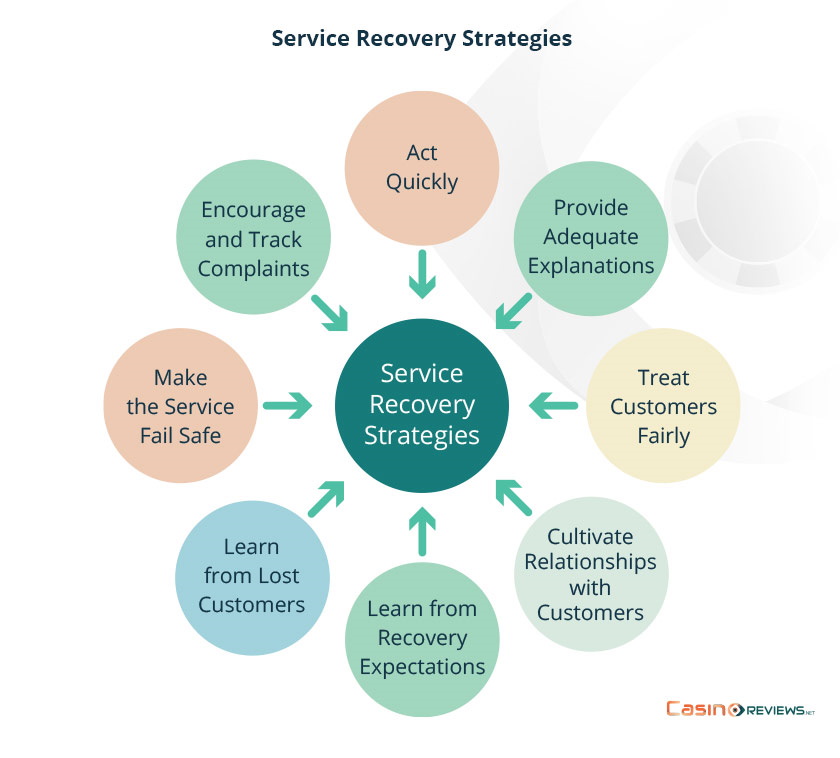Customer Complaints in Casinos and Other Businesses – Resolution and Preemption

Despite the service firm's best efforts, service failures are inevitable. However, accepting service failures as a part of everyday business can be the "kiss of death" for companies. At a time when customers are scarce, and loyalty is at a premium, casinos need to develop effective strategies for service recovery. Customer complaints should be viewed as valuable feedback and as opportunities to strengthen the bond with customers. The notion of Perceived Justice should be the cornerstone of all service recovery strategies.
My Recent Experience: A Praxis Perspective
After a long hiatus, Australia allowed its citizens to travel internationally. With pent-up wanderlust bursting at the seams, I booked my flight to the United States on Qantas Airways. My four-week journey started on May 26th and ended on June 22nd, 2022, when I left Las Vegas for my return trip to Brisbane. The connecting flight from Las Vegas to Los Angeles was late by about three hours. I literally had to run as fast as I could from the AA terminal to the international terminal at Los Angeles airport for my flight back to Australia.
Little did I realize that Qantas had not loaded my bag on the return flight. After landing in Brisbane, I waited, and waited, and waited for my bag to arrive at the carousel until the last bit of luggage was delivered. Realizing that something was amiss, I stood in line at Qantas Baggage Services along with other passengers with the same forlorn look on their faces as me. "Your bag was not loaded onto the flight," said the lady at the baggage counter nonchalantly. "It will probably arrive tomorrow, and we will deliver it to your residence after it clears customs." She had me fill out some forms, provide description of my bag, and gave me a file number.
When the bag, which was used only once before, was delivered to my home the next afternoon, it was badly cracked at the side, which made the wheels almost come off. Someone (from Qantas) had put a sticky tape on the wheels to prevent them from falling off. What's more, some items were missing from the bag—a shirt, some Indian dessert which I was looking forward to eating, and some gourmet cat treats available only in the U.S. that my cat would have profusely thanked me for.
Right away, I filed a complaint regarding the damaged luggage using the very tedious online form provided by Qantas. Nothing happened for the first four days. I then started to put my damaged luggage story on LinkedIn, Twitter, Facebook, and Instagram for others to read. I did get a response on Facebook Messenger from Qantas about six days into this adventure.
The message read, "Hi Sudhir, your file is sitting in our damaged baggage queue. Our Customer Care team will contact you directly once they review your case. Please note that we operate separately from our Customer Care team. Due to the high volume of inquiries received, they're taking longer than usual to respond. We appreciate your patience and understanding. PD"
Imagine that. The airline is using its own ineptness as an excuse saying that they could not attend to my request right away because "of the high volume of inquiries received." If they operated more diligently, there would be no "high volume" of customers to deal with. Either that, or the airline must have retrenched a substantial portion of their customer service staff (after all, you have to cut corners to pay multimillion-dollar bonuses to the senior executives).
As someone who has been championing customer service and customer experience for decades, I was not going to be easily deterred by the airline's deliberate delay tactics. I intensified my "campaigning" on social media, especially LinkedIn. In response to my posts, I heard from hundreds of other customers equally dissatisfied with Qantas. I then tagged an individual at the Board of Qantas in one of my rants, which, I must admit, were getting more and more caustic each day. This post did get an immediate response. Someone from the executive's office called me, and the matter was eventually resolved. By then, it was two weeks since the dreaded incident happened.
Let's face it. No service company is perfect. However, one must wonder why there are so many dissatisfied Qantas customers than there are Southwest Airlines or Singapore Airlines customers. The difference is that a good airline has fewer catastrophes, and they promptly fix the problem when such mishaps do happen. Qantas Airways, however, may have thought that if they ignored the complaint, the customer would eventually give up.
The Casino Context
Integrated Resort Casinos also have their fair share of catastrophes when it comes to customer service. A rude dealer, a botched-up hotel reservation, a hotel room with someone else's blood on the sheets (I actually noticed blood stains on my sheets when I checked into the Excalibur in Las Vegas just a month and a half ago), or problems with Wi-Fi or plumbing in the room—there could be myriad such issues that affect customers every day. Fail points in customer service will never be completely eradicated. But service recovery after a slip-up is always possible and should never be optional. Let's use the opening vignette of Qantas Airways as an example.
The fact about customer service is that only one in twenty-six customers actually complains to the service provider when things go wrong. The other 25 customers will simply take their business elsewhere without a word or accept customer service mishaps as a fact of life. 13% of disgruntled customers will share their negative experience with fifteen or more people. These statistics suggest that it is important that you let customers know they have a voice and that you will listen and act when things go wrong.
Complaining customers provide the firm with an opportunity to recover from the service failure. Unfortunately, many companies—especially casino businesses—often drop the ball and further aggravate the customer by failing to act and recover from service failure. Let's look at what an aggrieved customer typically expects by way of service recovery.
When a failure in service delivery occurs, customers weigh their inputs against their outputs when forming recovery evaluations. Inputs associated with a service failure include costs such as economic, time, energy, and psychic costs. In the case of Qantas Airways, my economic costs included a four-hundred-dollar bag rendered useless, not to mention the loss of the missing items. I spent several hours writing e-mails to Qantas and making several posts about the airline's ineptness in service recovery across several social media. If I equate the time I spent dealing with this situation with my hourly wages, it will add up to a couple of thousand dollars.
The customer then compares the cumulative inputs to the outputs (what they receive from the service provider by way of recovery). The outputs typically assume the form of the specific recovery tactic (e.g., cash refund, apology, replacement, or free upgrades), the manner of personnel in dealing with the service failure, and the policies of the organization to handle such situations. The customer's satisfaction with the service recovery is based on the perceived justice the customer receives.
Perceived justice is the customer's expectation of fairness along three dimensions: outcome fairness, procedural fairness, and interactional fairness.
- Outcome Fairness: As a customer, who had been loyal to Qantas for twenty-five years, I expected compensation that matched the level of my dissatisfaction. I expected a certain level of equity from the exchange. I wanted to believe that the airline had "paid" for its mistakes in a manner at least equal to what I had suffered. In my case, the airline awarded me a cash compensation of $399. While this covered the depreciated value of the suitcase and possibly its contents, I came out of the situation believing that I had only received a moderate level of outcome justice.
- Procedural Fairness: Every large organization and casino company has procedures in place to deal with customer complaints. Procedural fairness or justice examines the process that is undertaken to arrive at the final outcome. Research suggests that while implementing identical recovery strategies, those that are implemented promptly are much more likely to be associated with higher customer satisfaction and customer retention than their "delayed" counterparts.
In the case of Qantas, the airline would not look at my case for several days because of the "high volume" of complaints they had to deal with. By admitting that they had a large number of unresolved complaints, the airline displayed its procedural ineptitude in service recovery. A phone call within 48 hours of receiving the complaint would have gone a long way in enhancing the company's perceived procedural justice. Furthermore, to suggest that the Customer Care team operates independently of the team responding to customer messages on Facebook is an admission of impenetrable silos, something no customer wants to see or experience. - Interactional Fairness: Above and beyond their expectations of just compensation and prompt, hassle-free procedures, customers expect to be treated with politeness, courtesy, and honesty. It was only when I approached Qantas Airways at the board level did I get to see these qualities in my interactions with the company. Prior to that, all that I had experienced in my various contacts with the company was apathy, lame excuses, and neglect. Had there been interactional justice, to begin with, I probably would not have pursued the matter with such belligerence or at such high levels.
In essence, the Qantas Airways example brings to the fore crucial lessons that casino executives could benefit from. First, the three components of perceived justice must be taken into account when formulating effective service recovery strategies. Deploying recovery efforts that satisfy the criterion of outcome fairness without consideration of procedural and interactional fairness needs may still result in customer discontent or even defection.
Second, casinos need to be proactive in service recovery to preempt problems from occurring in the first place. Managers need to identify common failure situations, minimize their occurrence, and train their employees to recover from service failures when slip-ups do happen.
Finally, a company—be it a casino or an airline—should encourage customer complaints. Customer complaints should be viewed as opportunities to improve the service delivery system and to ensure that the customer is satisfied with the service encounter. It is not the complainers that casinos should be worried about - it's the customers who leave without saying a word, who do not intend to return (would I want to stay at the Excalibur after seeing blood stains on the sheets?), and who inform others of their experience (like yours truly).

Conclusion
The Qantas Airways example illustrates how even large professional organizations fail in their responses to customer complaints. Customers are the lifeblood of businesses, and customer complaints are symptomatic of some pathological issue in the organization's DNA. Figure 1 offers eight simple guidelines to deal with service failures. Casino companies and other service organizations should constantly strive to put these eight guidelines into practice.
Source: Zeithaml, V.A., Bitner M.J., and Gremler, D.D. (2006). Services Marketing: Integrating Customer Focus Across the Firm, 4th Ed., New York, NY: McGraw Hill/Irwin.





Review this Blog
Leave a Comment
User Comments
comments for Customer Complaints in Casinos and Other Businesses – Resolution and Preemption